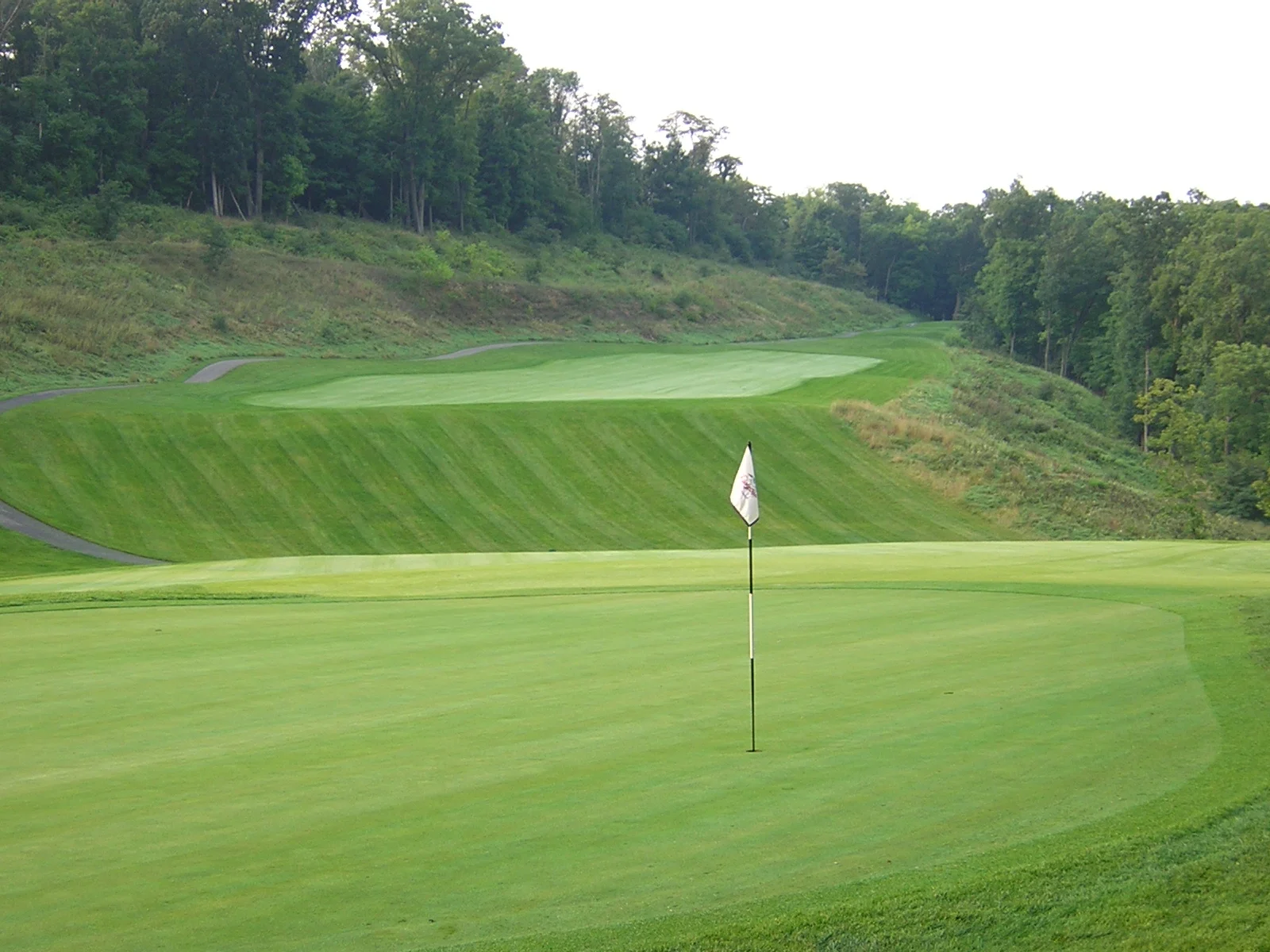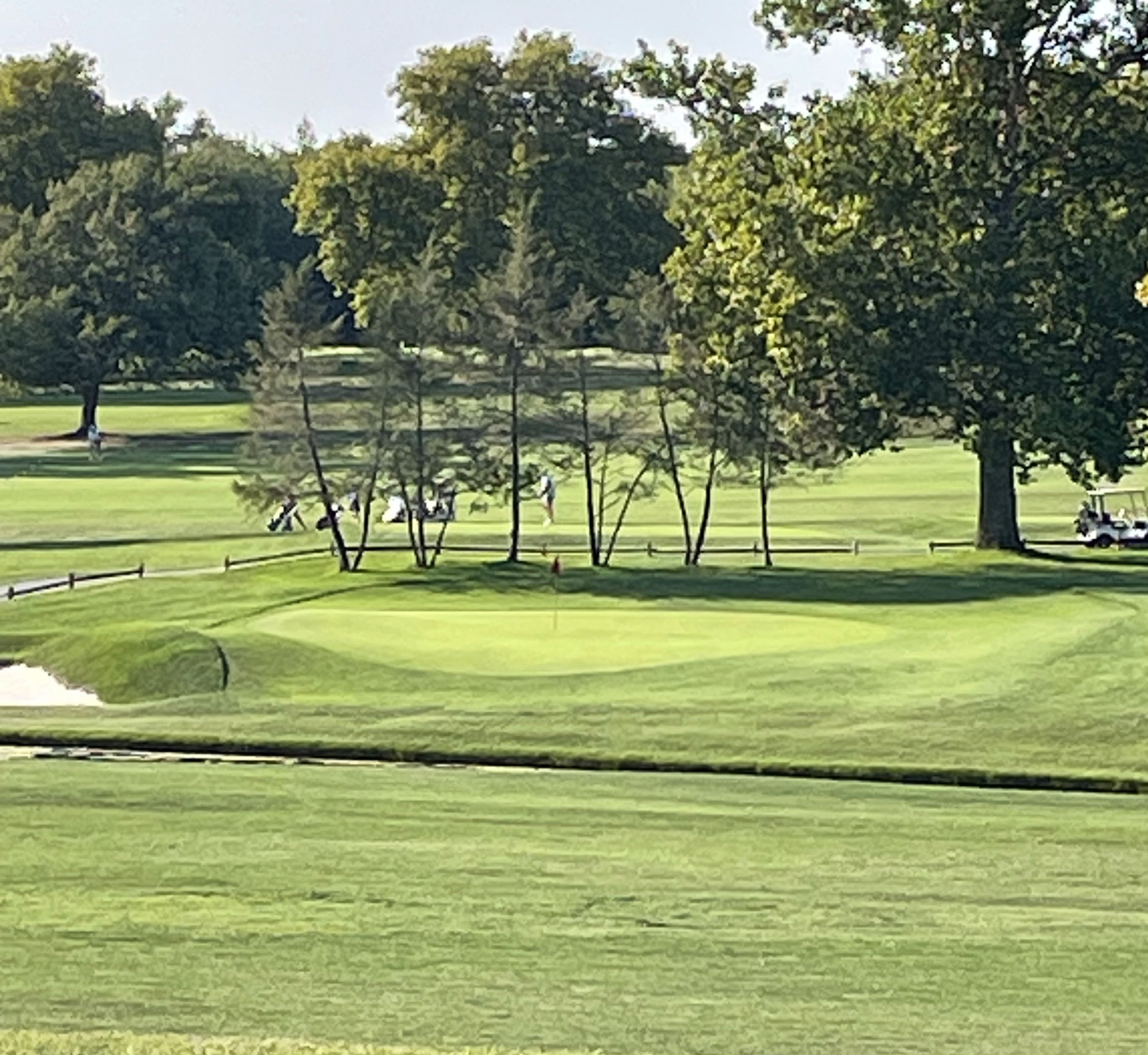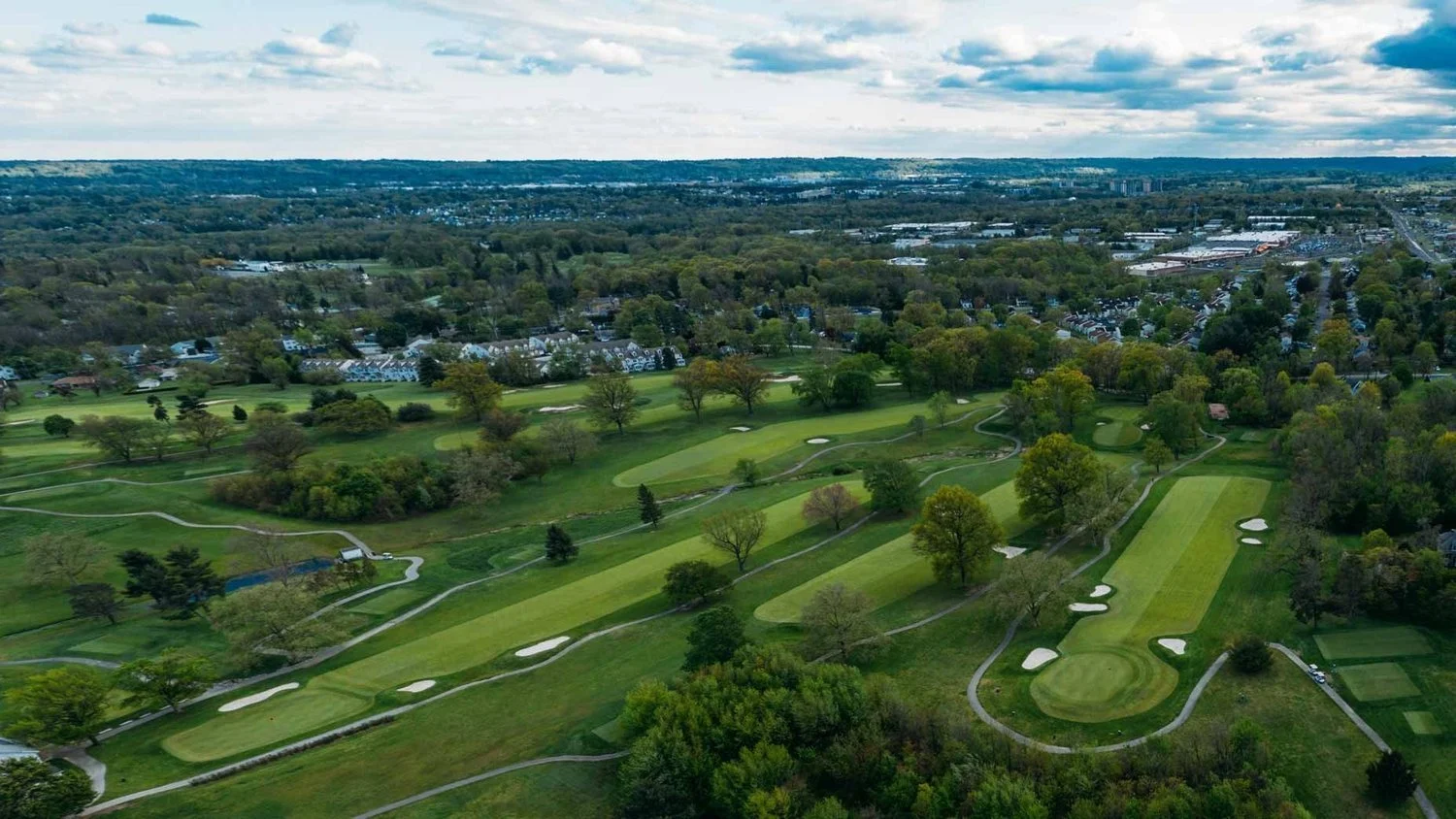ROCKY GAP LODGE & GOLF RESORT
Course Architect: Jack Nicklaus
Year Opened: 1999
Location: Flinstone, Maryland
Slope: 142. Rating: 74.2
Par: 72
Yardage: 7,002
Hole-by-Hole: 1 - Par 4 408 Yds 10 - Par 5 559 Yds
2 - Par 4 381 Yds 11 - Par 4 421 Yds
3 - Par 4 472 Yds 12 - Par 3 160 Yds
4 - Par 3 174 Yds 13 - Par 5 565 Yds
5 - Par 5 542 Yds 14 - Par 4 439 Yds
6 - Par 3 226 Yds 15 - Par 5 535 Yds
7 - Par 4 395 Yds 16 - Par 3 190 Yds
8 - Par 5 509 Yds 17 - Par 3 206 Yds
9 - Par 4 392 Yds 18 - Par 4 428 Yds
Par 36 3,499 Yds Par 36 3,503 Yds
Awards Won: Rated 4 stars by Golf Digest - Best Places to Play (2007),
America's Best Golf Courses by Zagat (2007-08).
Website: rockygapresort.com
HISTORY: Located just seven miles east of the city of Cumberland in Western
Maryland, Rocky Gap Lodge & Golf Resort is home to the only Jack Nicklaus
signature course in the "Old Line State."
Part of Rocky Gap State Park, which encompasses over 3,000 acres of public
land, the resort is situated around beautiful Lake Habeeb in the shadows of
Evitt's Mountain.
Rocky Gap is part of Program Open Space, which was established in 1969 and
is funded through The Department of Natural Resources. The program dedicates
funds for Maryland's state and local parks and conservation areas.
The course itself was developed by the Maryland Economic Development
Corporation, an agency created in 1984 that allows the state of Maryland the
ability to directly own or develop property for economic growth.
Nicklaus, who has designed over 300 courses world-wide, was given the task of
creating a challenging, but playable layout in the Appalachian Mountains. He
certainly accomplished his task. Rocky Gap is a course for all levels of play,
and the resort, well, all you have to do is ask the hundreds of thousands of
guests who've frequented the area the past decade.
"The Rocky Gap Lodge and Golf Resort is a jewel of Western Maryland,"
commented Allegany County Commissioner Jim Stakem. Rocky Gap, which employs
over 300 staff members in the high season, "was created to spur economic
development in the region." In 2005, Rocky Gap hosted nearly 700 events and
was recently voted one of America's Best Golf Courses by Zagat Survey.
REVIEW: One of the easier holes on the course, the first is a perfect starting
hole, just 408 yards from the elevated tips to a very generous fairway. The
key is avoiding the fairway bunkers on both sides of the landing area. Just a
short iron should remain to a very receptive green. The putting surface is
fairly flat, but beware of the bunker guarding the left side that sits well
below the green. A good hole to get your feet wet.
Although the second hole is fairly short at 381 yards, it plays uphill and
requires a 200-yard poke from the black tees to reach the fairway. Driver is
the play off the tee, just avoid the bunker down the left and you'll leave
yourself a wedge to a very undulating green. The putting surface is 33 paces
long and very similar in style to the first, except for the back-to-front
slope. A back-left pin could spell doom if you short-side yourself.
Talk about a premium on accuracy, the tee shot on the third could be the most
difficult on the course. Carved into the side of a mountain, this par four is
the number one handicap hole on the course and rightfully so. Downhill from
the tee, a steeped ridge blankets the left side, while the uneven, hilly
landscape guards the right. The deep rough covers for the lack of fairway
bunkers, so you must keep it in the short grass. A fairway metal or hybrid
will remain to a slightly elevated and sloping green. Stay below the hole and
play left of the bunker to the right, as it makes for a very difficult up and
down.
The first of five sensational par threes, the fourth plays ever-so slightly
downhill to a narrow green, that's just 17 steps wide. A mid to short iron
should suffice to this tight, well-guard surface. A deep, massive bunker
stands watch on the right and must be avoided at all costs. The hole is framed
beautifully by the deep woods behind and to the right, but don't get caught up
in the splendor, there's work to be done.
By far, the most spectacular hole at Rocky Gap, the fifth, is not only
electrifying, it's also terrifying. This awesome par five plays downhill from
tee to green. A pair of fairway bunkers lie in wait in the center of the
enormously-wide landing area. Tall trees stand watch on both sides of the
hole, as it narrows towards the green. It's worth the risk off the tee of
trying to explode a drive over the traps down the right. This can set up a
reasonable chance of getting home in two. Trouble looms down the left in the
form of thick rough and your layup shot, if that's your choice, will be to a
narrow sliver of fairway guarded on the right by sand. Another deep greenside
trap guards the putting surface that swings around to the right. A front flag
can be had, but a back-right pin brings plenty into the mix. Don't get greedy.
The longest of the par three's, the sixth is another beautiful and devilish
hole. A whopping 226 yards from the back buttons, it plays downhill, so club
selection could be tricky, especially with the outstanding views of the
countryside. Pick the right stick and you could be putting for birdie. Miss
long left or right and you'll be searching for balls. The green is very narrow
with sand short and deep. A par here can go along way on the scorecard. I
could have use it, instead of my six!
Another hole that puts a premium on accuracy is the short, dogleg right
seventh. At 395 yards, a fairway metal or hybrid could be the play off the
tee, as the slope of a mountain flanks the right and thick rough guards the
left. This is where the fun begins, as the green is protected by a lateral
hazard that runs from left to right in front of the putting surface. A back-
right pin really brings the trouble into play, as the green is just 12 paces
wide. Don't be shy about bailing out left, it sure beats putting one in the
drink.
At first look, the par-five eighth seems to be a pushover at just 509 yards
off the black tees, but not so fast. This straightaway hole, plays uphill from
tee to green, with thick trees down the right and dense underbrush left. So
the key here is an accurate tee ball, setting up a fairway metal or iron to
layup for your approach. Going for the green in two can be risky, with trees
down both sides of the fairway. The putting surface is sandwiched between
mounds on either side. The green is long and two-tiered, but is very narrow
with sand guarding the left-front. With a front pin, use the slope behind to
spin the ball close for birdie.
Returning back towards the resort, the ninth is a slight dogleg left that
again plays uphill from the tee. Guard against going left from the start, as
trees protect against the aggressive play. Your tee ball should favor a slight
draw with a driver or three-metal. This will leave a short iron to a very
receptive green, 23 yards wide. Two bunkers protect both sides of the green,
however, any shot long and left will finish out of bounds, so choose the
correct club from the fairway. Standing on the green offers a sensational view
of the lodge and lake. Take care of the task at hand and then enjoy your
surroundings.
The back nine opens with a downhill par five that reaches 559 yards from the
tips. Navigating the fairway bunkers on either side of the landing area is key
to set up your best chance of getting home in two, or for laying up. It's best
to play short of the inlet of water that creeps in front of the isolated
green, setting up a little pitch to a very shallow putting surface. To reach
the green in two, you'll have to be long off the tee and longer with your
second. Not the correct play, especially when the carry from the fairway
reaches 250-plus. Make your birdie the old-fashioned way, wedge it close and
sink the putt.
One of five par fours over 400 yards, the 11th, despite its number 16 rating
on the scorecard, is not to be taken lightly. Devoid of fairway sand, the
landing area is quite generous, but even with a successful tee shot, a medium
iron will remain to an uphill, wide green that's guarded on the left by a deep
bunker. A back-left flag could be quite the challenge, so play towards the
center and get your par. There'll be other birdie chances later in the round.
One such possibility is the par-three 12th. The shortest on the course, this
160-yarder features a wide and shallow green. The two-tiered putting surface
is guarded on both sides by sand and out-of-bounds deep, making club selection
key. Stay below the hole and you'll have a great shot at a deuce.
With a beautiful, panoramic view of the area, the 13th plays downhill from tee
to green. This lengthy par five, the longest on the course, features an ample
fairway, with one lone bunker down the right side. The landing area tightens
for your second shot, with a slope left and a water hazard right, within 100
yards of the green. The putting surface is just 25 yards deep, with sand deep
and the pond covering the right. With a wedge in hand for your third, go for
it and make birdie.
From an elevated tee, the 14th is a solid, dog-leg right par four that
requires accuracy off the tee and pinpoint control with your approach. Two
bunkers guard the right side of the fairway, while a somewhat, dried-out creek
bed splits the landing area at the 280-yard mark off the back tee. A medium
iron should remain to an elevated green guarded on the right by a very deep
bunker. The putting surface slopes from back to front and with a back-right
pin, this could end up being one of the most difficult holes on the course. By
the way, long and right is OB, so play smart.
The final par five on the course, the 15th is one of the most difficult
driving holes at Rocky Gap. A tight landing area, with a thick, grassy hazard
left and trees and massive rough right, make this one "Bear" of a hole. Even
after hitting the short grass off the tee, the layup area for your second is
even slimmer as you close towards the green. A split fairway, from 180 yards
in gives the player an option, however the best angle to the green is on the
right. The putting surface is 32 yards long, but just 19 paces wide with a
bunker fronting the left portion of the green. As far as par fives go, a par
here will look fine on the card.
The first of back-to-back par three's, the 16th is a downhill gem that
requires the proper club selection, as the wind usually plays havoc. The
putting surface is shallow and guarded in front by a deep, 20-yard wide
bunker. A back-right pin brings the hazard into play, so execute sensibly or a
big number could be in the mix.
Built into the side of a hill, the 17th offers a great view of the mountain
range and when the fall colors are flourishing, this is one spectacular sight.
A long iron or hybrid will be needed to reach the promised land and when the
pin is back and left, add another 20 plus yards to your total. Two deep
bunkers guard the left side of the putting surface, making for a difficult up-
and-down. The play, a nice, high draw to the right, two putts for three and
move on.
With the wind in your face and the fairway uphill from the tee, you'll need a
200-yard poke to reach the wide landing area. Sand protects both sides of the
fairway, so an accurate and big blast is required. A mid to long iron is left
to a slightly elevated green that's wider than deep. The putting surface
features a bowl in the center that forces most shots to funnel towards the
front. Offline or deep and you'll find one of the three surrounding bunkers.
FINAL WORD: Wow. Now that was a fun golf course. Let's start out with the
playability of Rocky Gap. Five sets of tee boxes allow all levels of play to
tackle this Jack Nicklaus beauty. Tees range from as little as 5,198 yards to
just over 7,000 and that is really the key to playing this golf course.
Next up is conditioning and you'll be hard-pressed to find another public
course in better shape than Rocky Gap. The tees are firm, the fairways well-
manicured and the greens contoured and smooth.
This is typical Nicklaus. No let-up from the first tee to the final putt. What
makes this course stand out is its variety of holes. From doglegs left and
right, to short and long par three's and a mix of wonderful elevation changes.
The front nine, except the first hole, is tree-lined and tight, while the back
nine is more wide-open, but featuring several risk-reward holes. Let's not
forget the several outstanding views of Lake Habeeb and Evitt's Mountain. I
only wished that the course played alongside the water's edge, as it never
touches the shoreline.
Rocky Gap is perfectly situated just two hours from Pittsburgh, Baltimore and
Washington, D.C. and a little longer from Philadelphia. So, not only can you
drive to the resort, you can play the same day!
There are many "signature" holes at Rocky Gap Lodge & Golf Resort, but my
favorites are five, six and seven on the front nine and 13 through 17 on the
closing stretch.
What makes Rocky Gap even more appealing is the beautiful lodge that stands
tall overlooking the 243-acre lake. Not only does the resort feature 215 rooms
and wonderful dining, there are miles of hiking trails, numerous boating and
fishing activities and the luxurious spa.
What more could one ask for. A serene and peaceful setting, wonderful
accommodations at a AAA Four-Diamond resort and a Jack Nicklaus championship
golf course. With wonderful Stay-and-Play packages and amazing golf rates for
non-guests, you'd be making a huge mistake bypassing this experience. If
peace and quiet and serenity is what you seek, you've come to the right place.
Rocky Gap Lodge & Golf Resort met all my needs and then some. I just hope they
invite me back.







